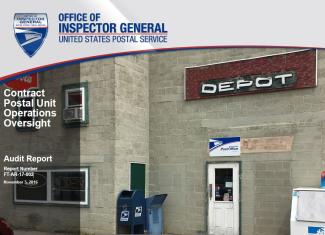Usus contract unit meaning

Whistleblower Complaint Form

Report Fraud, Waste, and Abuse
Expands the main menu
Need help with your mail/package?
Go to usps.com
Whistleblower Complaint Form
Report Fraud, Waste, and Abuse
Dialog for search input
Need help with your mail/package? Go to usps.com
Breadcrumb
Audit Reports

Report Number:
Report Type:
Audit Reports
Category: Finance
Contract Postal Unit Operations Oversight
Background
A contract postal unit (CPU) is a retail establishment under contract to the U.S. Postal Service to provide postal services to the public. The objective of the CPU program is to reduce customer wait time in post offices, retain and increase Postal Service market share, reduce operational costs, improve customer satisfaction, and grow retail revenue.
Although CPUs have declined in number from 5,290 in fiscal year (FY) 2002 to 2,656 in FY 2016, they enhance service by being located closer to customers’ homes and workplaces and operating at hours when post offices may not be open. They also provide postal services to areas with rapid population growth or where opening new post offices may be cost prohibitive. In FY 2015, total revenue from CPUs was $484,273,289, and the Postal Service incurred $0.15 in cost for each dollar of revenue at CPUs.
The Postal Service’s host administrative office (host office) administers CPU contracts, provides training to the CPUs, monitors CPU operations, and ensures contract compliance. Host offices conduct quarterly performance reviews to promote continuous quality performance and improve the business relationship among the host office, CPU, and public. District management oversees the host office.
Our objective was to determine whether the Postal Service’s oversight controls over CPUs and accountable property at the CPUs were adequate, effective, and followed.
What the OIG Found
Postal Service controls over CPUs and accountable property at the 21 CPUs we visited were not always adequate, effective, or followed. We found:
- District personnel did not adequately monitor operations at the 21 host offices visited. For example, personnel at all districts visited were not always aware of host office personnel changes. In addition, in four of 67 quarterly performance review certifications evaluated, district personnel did not verify the accuracy of the information.
- Personnel at all 21 host offices visited did not effectively monitor overall CPU operations. They were unaware of available resources and, at 16 of 21 CPUs, did not adequately perform quarterly performance reviews. In addition, personnel at three host offices did not maintain adequate contact with CPUs and personnel at two host offices did not adequately train CPU employees.
- The quarterly performance review was not an effective oversight tool. Personnel did not review the required number of packages in eight of 23 Quarter 3, FY 2016 reviews, and words or phrases were not always defined. Further, the tool did not allow for review comments or follow-up for exceptions, and the quarterly performance reviews did not sufficiently address accountable items.
- CPU census data, which includes critical information such as hours of operation, bond, and CPU employee information to help the Postal Service better understand and support the CPU, was not always complete or accurate. For three of 21 CPUs, census data was blank and, for one CPU, host office personnel did not enter the date of the annual financial audit.
- Personnel at host offices did not maintain complete CPU administrative files. None of the 21 CPU administrative files we reviewed contained all of the required documentation, such as contracts and contract modifications, host office operating instructions, and property and equipment information. Further, CPU administrative files did not exist or were not available for three CPUs.
As a result, customer loyalty, good will towards the Postal Service, and the Postal Service’s business relationships with CPUs and its customers could significantly decline, which could result in substantial revenue loss. CPUs should always act in the Postal Service’s best interest to uphold the Postal Service’s brand and increase customer satisfaction.
We identified best practices used by some district and host office personnel that could improve CPU operations. For example, a district communicated information to a ZIP Code email address instead of a specific person. We also included suggested program improvements provided from district and host office personnel. For example, a host office suggested creating a help desk for host offices and CPU personnel to ask questions or report issues.
What the OIG Recommended
We recommended management:
- Enhance formal policies and procedures for districts.
- Develop a formal training program for host offices.
- Enhance the quarterly performance review to include steps on how to specifically account for money orders. Additionally, using threshold guidelines, include steps to conduct stamp counts, and ensure minimum package review.
- Consider implementing suggestions and best practices identified in this report.



